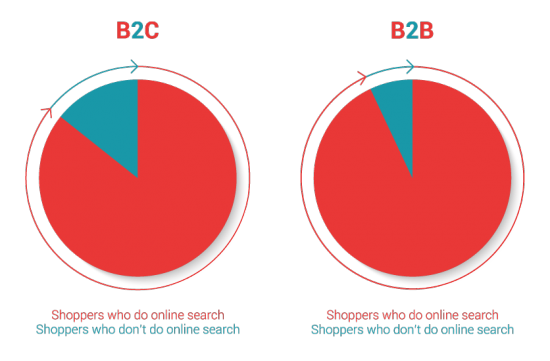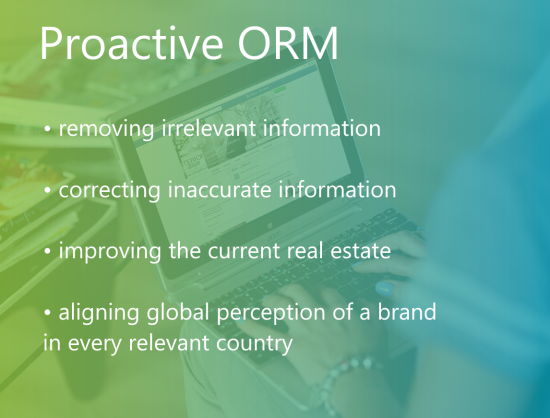Reputation matters. People buy brands they trust and read news they believe. When the BBC publishes a story about Antarctic penguins flying to South America, people believe it because of the broadcaster’s strong reputation for credibility. April Fool’s jokes are themselves a tool to add percentage points to a corporation’s reputation as likeable, friendly and customer-focused. But Online Reputation Management (ORM) isn’t something to do just one day a year – building a reputation that gives your brand real added value requires constant attention.
The right approach, the steps to take and the mistakes to avoid are revealed in our whitepaper, which was developed in partnership with guest author, Jason Barnard from kalicube.pro, a proactive ORM service for online brands.
Your customers are googling you
Your online reputation is largely shaped by what comes up when someone googles your brand. And this is happening. Prospects, customers, partners, future employees and investors are going to google your brand to judge your standing. Not a priority for your business right now? Consider this: In B2C, 81% of shoppers research online before buying. In B2B, 9 out of 10 purchases start with online research. Moreover, B2B buyers conduct an average of 12 searches before ever jumping on a specific brand’s site.
Even if you have never had a strong online position, the people you are doing business with – now or in the future – are almost certainly checking up on you online with a fine-toothed comb.
And it’s not only about a product you are selling – it’s about your brand experience, your online appearance and your trustworthiness. Search engines are often the first touch point at this stage. Imagine the search results being the “shopping window” of your brand to prospects, clients, business partners etc.
And how does Google perceive and structure information about your company? If you are a global company is it showing relevant information in every country index? Does that information truly represent what you are aiming to establish? Or does it bring shame to the name you’ve spent years trying to build up?
What if I told you that you have the power to ensure that the information about you that people find on Google is how you want it to be? No, this isn’t another well-disguised April Fool’s joke. It’s Online Reputation Management (ORM).
Proactive ORM – don’t wait for disaster to strike
Effective ORM means exercising maximum control of your brand’s web presence(s) to provide the most positive perception possible. This is where proactive ORM comes into play. The foundation of a successful ORM strategy is based on a perfectly optimized technical website being the starting point to elaborate, comprehensive, and correct content about you and your brand. It is up to you to ensure that, when Google and the other online platforms that are crawling your website’s data deliver information about you to users, that it is the information that you want delivered. And remember, the information, and the presentation varies enormously depending on the user’s situation (geo-location, device, tastes etc.).
ORM needs to be constantly kept in mind in order to have more control over what people are seeing about you when you are searched. A proactive ORM strategy is necessary to tackle irrelevant information or correct inaccurate information that may be ranking higher. By taking control over most of your online information you are less vulnerable to bad press, reviews, or negative SEO, as well as to other negative information about your brand.
But what could possibly go wrong?
So, what exactly could go wrong if you have no ORM strategy in place? Is it even worth the effort? That was probably not on the list of concerns of banking giant JPMorgan when they announced a live Twitter Q&A about leadership and career advice that was going to be hosted by one of its executives. It did not take long before their reminder tweet backfired and Twitter users around the world made use of this opportunity to lash out against JPMorgan, misusing their initial hashtag to ridicule and poke fun at the multinational banking firm, finally resulting in just a few hours in the firm calling off their Q&A session.
Taking control online – and keeping it
You work effortlessly to try to build a good image of yourself, you’re always on time, you meet deadlines and you are respectful and courteous towards others. You make sure your reputation is how you want it to be. Why should it be any different for your online presence? Too often, Online Reputation Management is something that people only think about when the damage has been done – when they receive a negative review, complaint from customers, or harmful tweets. The important thing to remember is that Online Reputation Management is something you need to work on day in, day out. Across all online channels, there is enormous potential to optimize your brand experience with easy-to-implement measures.
Not only is taking control of your ORM a vital part of your digital strategy, keeping control is also essential. New content is added all the time, and because the rules imposed by the search engines are constantly changing, the way your brand is presented can change dramatically from one day to the next. Therefore, your ORM needs to be regularly redefined and refined. For detailed insight into how you can execute and implement an effective ORM strategy for your brand, you can download our whitepaper below. If you don’t control your online reputation, someone else will.



